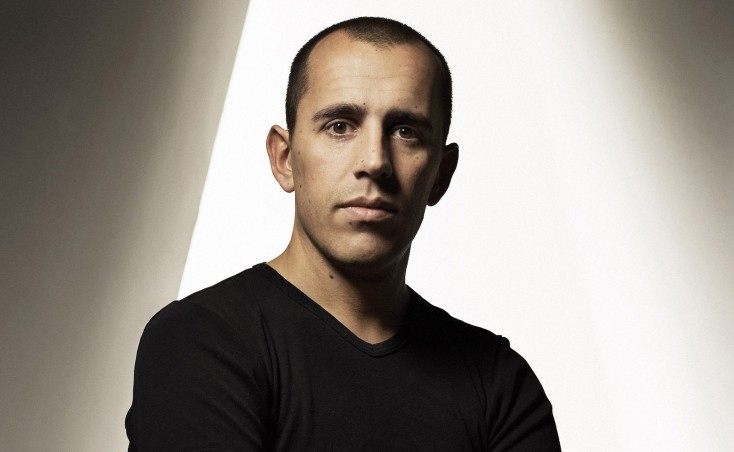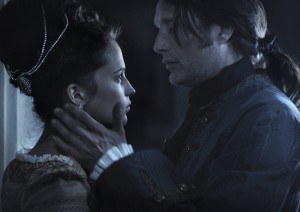By ANGELA DAWSON
Front Row Features
HOLLYWOOD—Every Danish schoolboy knows the story of the 18th century mad monarch Christian VII, his British-born queen Caroline and a court physician named Johann Struensee, who helped bring about social reforms in that small European country before getting caught in an illicit romance that brought him and his progressive ideas to an end.
Of course, this sordid, romantic and tragic bit of history is little known outside of Denmark.
“A Royal Affair,” the official Academy Awards entry from Denmark, written and directed by Nikolaj Arcel, means to change all that.
Reminiscent of classic British and American epic costume dramas, “A Royal Affair” is a lush and gorgeous production, with incredible locations, costumes and sets. It stars Danish star Mads Mikkelsen as Struensee, a flawed thinker, who rose from a mere country doctor to personal physician and trusted adviser to the king. Mikkelsen is best known as the blood-teared villain in 2006’s James Bond reboot “Casino Royale.” The drama also stars rising international star Alicia Vikander as the queen. The 24-year-old also appears in the epic drama “Anna Karenina” with Keira Knightley.
Arcel, who is best known outside of Denmark for writing the screenplay adaptation of the original “The Girl With the Dragon Tattoo,” recently spoke by phone about the tantalizing costume drama and the selection of “A Royal Affair” as his country’s official entry into the upcoming Academy Awards for best Foreign Language Film.
Q: This film reminded me of the big screen epics of David Lean like “Lawrence of Arabia” or “Great Expectations.”
Arcel: I’m so happy you’re saying that because those were some of my favorites. I’ve always been a fan of David Lean, and I always talked to the crew about how with this film, in a humble way, we were trying to go back that way of filmmaking.
Q: Has this opened in Europe?
Arcel: It opened in Denmark in March. And it’s opened in England, Australia and Germany and various other countries. It’s going to open in France in a month or so, so it has a couple of countries left.
Q: When did you become aware of this story?
Arcel: It’s a famous story in Denmark. It’s one of the classic true stories that we learn about in school. I had a teacher who was crazy about it and every year he told the story to us. It’s been with me since I was a kid. I never thought about doing it as a film until I made my second film (“Island of Lost Souls”) as a director. I wanted to do something based on a true story and I was fascinated by the idea of doing a historical drama. We started doing some research and found it fantastic that this story has never been made into a film in Denmark.
Q: Why do you supposed that is? Was it the expense or are Danish moviegoers interested in modern tales?
Arcel: It’s probably a little of both. In terms of this story, a lot of great Danish filmmakers have been trying to make it over the past 30 years. One reason they didn’t succeed is because they didn’t think Danish audiences were ready for it. They didn’t want to see a historic drama. Also, it’s expensive to do a film like this and the normal Danish budget is way below what you need to do a film like this. It’s not a usual genre here—the historic epic—only five or six of them have been made in the past 30 or 40 years.
Q: Why were you successful?
Arcel: I almost wasn’t. I spent a whole year doing the research. I wrote a script that I thought was efficient and could tell the story as well as I could tell it. Then we got stuck in financing. We couldn’t find the money for it. So it took me, from the moment, I embarked on writing the script to the moment we got the money to finance it, four years, which is a lot of time. There were times I thought I was going to be just another director who failed to bring this story to the screen. I think the reason why it did happen is that I found a way to do it where it felt contemporary and modern and that it could be interesting not only to myself and people around me, but also modern audiences. And we found a way to do it that wasn’t prohibitively expensive.
Q: What was the secret?
Arcel: I’m big on planning. I think a lot of money is wasted on not being sure what you want, and doing too much that you’re not going to use. I’m a little bit of an old school director because I make a lot of storyboards, and I plan meticulously. So when I get to the set, I can get a lot of stuff done. I can do a lot of stuff in a shorter period of time. That’s the secret: time is money.
Q: Was it difficult to get Mads since he’s so in demand internationally?
Arcel: It was easy to get him, which is kind of odd because I thought he would be the most impossible one to get, because he has so many offers. I was very lucky. I didn’t know Mads before this but I sent him the script and he called me out of the blue five days later and said, “Let’s do it.” So it was the easiest bit of casting I’ve done in my life actually, so I was very happy. He felt the same way. I wrote it with him in mind so if he had said no, I don’t know what I would have done. I think he sensed that. It was a good way for him to come back to Denmark because he hadn’t actually done a Danish film in five years before our film. I got him back home.
Q: Was Alicia Vikander an unknown when you cast her?
Arcel: Oh yes. She was a complete unknown. Then everything started for her at once. I cast her and felt very lucky that I’d found someone really amazing. Then three weeks later, her first independent Swedish film came out and she won that year’s Swedish Oscar for best actress. So she skyrocketed in a matter of a couple of months. While we shooting this film, she went from basically a nobody to a huge star in Scandinavia. And now with “Anna Karenina,” she’s becoming a huge star over here.
Q: Some might see Struensee as an ambitious, Svengali-like character. He also has some progressive ideas. But he’s not a complete good guy. He’s corrupted by power. Did you set out to depict this character as flawed?
Arcel: Absolutely. One of the most exciting aspects of writing and directing this film was these were real characters who actually existed. I always felt that one of the interesting things about Johann is that he’s a small town doctor and he comes to the court and becomes the de-facto king of Denmark, and of course that corrupts him. Something happens to him, even though he’s basically a good guy and wants to do good things. But when you have power, it’s a basic truth that no matter who you are, it does corrupt you somehow.
Q: Americans may see some similarities to our own political climate, because there’s a line in the movie about how Johann wants to implement change. Obviously, that word was a mantra for President Obama’s getting into office during the first term. Have you gotten that impression from Americans who’ve seen this?
Arcel: I have. Americans seem to get this film on every single level. I was partly inspired by the whole Obama journey because one of the big journeys of the film is Johann comes in as a little bit of an outsider. He comes to court and tries to change every thing. Also, he’s kind of a new guy to this. He doesn’t know how to play the game and he finds out that politics isn’t just ideas and visions. He finds out politics is like a puzzle. It’s a game of strategy. And in many ways, some Americans see a little bit of that journey in Johann because he becomes more tired towards the end. He finds out he wanted to change things but it’s very hard to change if you don’t know how to play the game.
Q: Once you got started, what became the biggest challenge for you?
Arcel: One of the difficult things it’s a learning curve making a historic film. For example, the wigs. People wore wigs in this period and you have to start choosing that and figuring out what will the actors wear. You also have to deal with big costumes that are making the actors uncomfortable and dealing with horses and extras. I was a little bit scared of horses when we started doing this film but now I feel very comfortable around them. So there are a lot of practicalities in it. But in terms of telling the story I had the great fortune of really only being interested in the characters and what their emotional lives were like and what they were going through. I wasn’t thinking that much about the surroundings because I had a great team to do all that for me.
Q: The story feels contemporary yet you didn’t resort to throwing in rock songs. I’m sure it was quite a balance act.
Arcel: It was, and it’s something we had to find during the shooting and the editing of the film. We always tried to find the balance of making an epic—I love “Gone with the Wind” and those types of films—but also we wanted to do a film that felt contemporary. I wanted to be intimate with the characters, and not look at them from a distance but very close to them. Finding that balance is key to doing anything like this.
Q: What was executive producer Lars von Trier’s involvement?
Arcel: He’s a friend of mine. Sometimes he invites me in to his editing room to see his unfinished films and I get to read his scripts before he shoots them and I do the same with him. He’s helped me with various projects before. This time I felt his expertise was really needed on this and I wanted him to be part of it. I asked him if he would produce the film, and be part of the script and be part of the editing. I wanted him to be the mentor he already is. He came in five or six times while we were editing the film and had great opinions on how to polish and finish the story.
Q: Congratulations on becoming the official Danish entry into the Academy Awards. What’s the significance for you?
Arcel: It’s significant because it means out of the films that were made in Denmark this year, the committee found that this was the one they wanted to send (to the Oscars), which is an honor to me. Honestly, I’m just happy. I try not to think too much about what this means. I’m just happy to be among these amazing films. I think there are 71 of them (in contention). I have said I want to see them all in the next two months because I want to know what we’re up against. (He laughs.)






